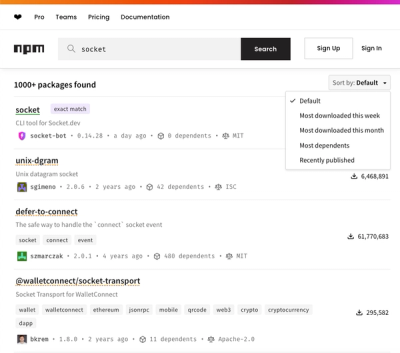
Security News
npm Updates Search Experience with New Objective Sorting Options
npm has a revamped search experience with new, more transparent sorting options—Relevance, Downloads, Dependents, and Publish Date.
cdk-spot-one
Advanced tools
One spot instance with EIP and defined duration. No interruption.
Sometimes we need an Amazon EC2 instance with static fixed IP for testing or development purpose for a duration of
time(probably hours). We need to make sure during this time, no interruption will occur and we don't want to pay
for on-demand rate. cdk-spot-one helps you reserve one single spot instance with pre-allocated or new
Elastic IP addresses(EIP) with defined blockDuration, during which time the spot instance will be secured with no spot interruption.
Behind the scene, cdk-spot-one provisions a spot fleet with capacity of single instance for you and it associates the EIP with this instance. The spot fleet is reserved as spot block with blockDuration from one hour up to six hours to ensure the high availability for your spot instance.
Multiple spot instances are possible by simply specifying the targetCapacity construct property, but we only associate the EIP with the first spot instance at this moment.
Enjoy your highly durable one spot instance with AWS CDK!
import { SpotFleet } from 'cdk-spot-one';
// create the first fleet for one hour and associate with our existing EIP
const fleet = new SpotFleet(stack, 'SpotFleet')
// configure the expiration after 1 hour
fleet.expireAfter(Duration.hours(1))
// create the 2nd fleet with single Gravition 2 instance for 6 hours and associate with new EIP
const fleet2 = new SpotFleet(stack, 'SpotFleet2', {
blockDuration: BlockDuration.SIX_HOURS,
eipAllocationId: 'eipalloc-0d1bc6d85895a5410',
defaultInstanceType: new InstanceType('c6g.large'),
vpc: fleet.vpc,
})
// configure the expiration after 6 hours
fleet2.expireAfter(Duration.hours(6))
// print the instanceId from each spot fleet
new CfnOutput(stack, 'SpotFleetInstanceId', { value: fleet.instanceId })
new CfnOutput(stack, 'SpotFleet2InstanceId', { value: fleet2.instanceId })
const fleet = new SpotFleet(stack, 'SpotFleet', {
blockDuration: BlockDuration.NONE,
})
NOTE: This kind of spot instance will be interrupted by AWS. However the fleet is using type maintain, the fleet can be refulfilled.
cdk-spot-one selects the latest Amazon Linux 2 AMI for your ARM64 instances. Simply select the instance types with the defaultInstanceType property and the SpotFleet will auto configure correct AMI for the instance.
defaultInstanceType: new InstanceType('c6g.large')
By default the cdk-spot-one does not assign any SSH public key for you on the instance. You are encouraged to use ec2-instance-connect to send your public key from local followed by one-time SSH connect.
For example:
pubkey="$HOME/.ssh/aws_2020_id_rsa.pub"
echo "sending public key to ${instanceId}"
aws ec2-instance-connect send-ssh-public-key --instance-id ${instanceId} --instance-os-user ec2-user \
--ssh-public-key file://${pubkey} --availability-zone ${az}
You may also create a simple ec2-connect.sh script like this and save in your $PATH:
#!/bin/bash
instanceId=$1
pubkey="$HOME/.ssh/aws_2020_id_rsa.pub"
sshUser='ec2-user'
az=$(aws ec2 describe-instances --instance-id ${instanceId} --query 'Reservations[0].Instances[0].Placement.AvailabilityZone' --output text)
publicIp=$(aws ec2 describe-instances --instance-id ${instanceId} --query 'Reservations[0].Instances[0].PublicIpAddress' --output text)
echo "sending public key to ${instanceId}"
aws ec2-instance-connect send-ssh-public-key --instance-id ${instanceId} --instance-os-user ${sshUser} \
--ssh-public-key file://${pubkey} --availability-zone ${az} > /dev/null
if [[ $2 != '--send-key-only' ]]; then
echo "connecting to ${publicIp} at ${az}"
ssh ${sshUser}@${publicIp}
fi
And simply run this to connect to the EC2 instance.
$ ec2-connect.sh i-01f827ab9de7b93a9
It's also possible to explicitly specify your existing SSH key with the keyName construct property if you like.
FAQs
One spot instance with EIP and defined duration. No interruption.
The npm package cdk-spot-one receives a total of 40 weekly downloads. As such, cdk-spot-one popularity was classified as not popular.
We found that cdk-spot-one demonstrated a not healthy version release cadence and project activity because the last version was released a year ago. It has 1 open source maintainer collaborating on the project.
Did you know?

Socket for GitHub automatically highlights issues in each pull request and monitors the health of all your open source dependencies. Discover the contents of your packages and block harmful activity before you install or update your dependencies.

Security News
npm has a revamped search experience with new, more transparent sorting options—Relevance, Downloads, Dependents, and Publish Date.

Security News
A supply chain attack has been detected in versions 1.95.6 and 1.95.7 of the popular @solana/web3.js library.

Research
Security News
A malicious npm package targets Solana developers, rerouting funds in 2% of transactions to a hardcoded address.